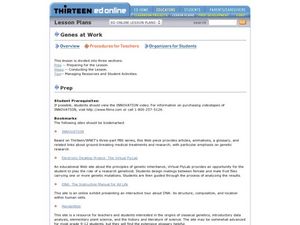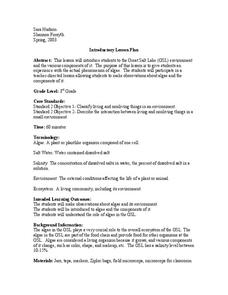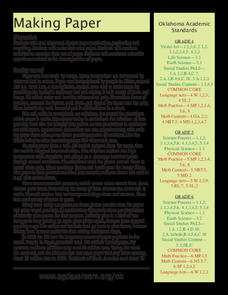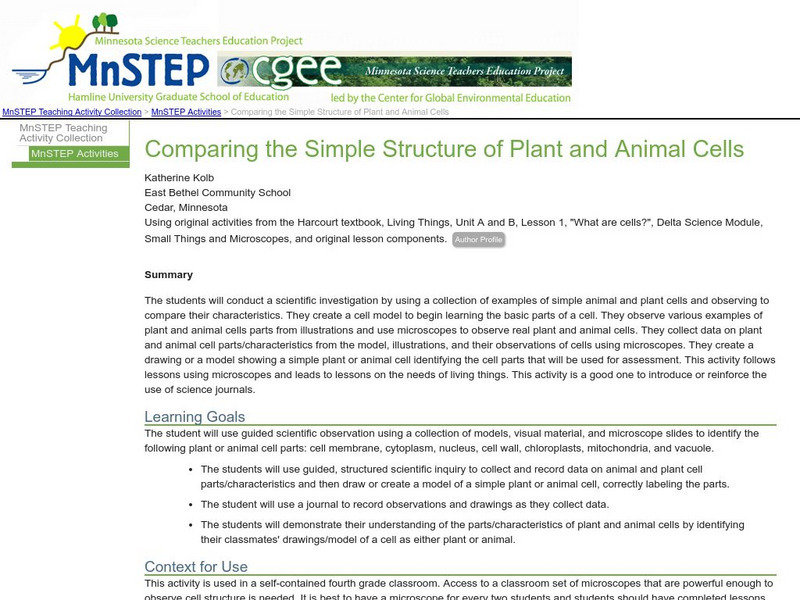Curated OER
Eutrophication Experiments
Observe two different water samples and write down observations. Write a paragraph which predicts the relative amounts of nutrients, nitrates, and phosphates in the water samples. Compare water samples under a microscope.
Curated OER
Dietary Fiber
Students examine the different types of fiber and their benefits. For this investigative lesson students find good sources of fiber in different foods.
Curated OER
Science Lesson: Chocolate Flavored Cherries
Students are able to identify start and stop sequences in DNA. They are able to model using restriction enzyme and ligase to remove sections of DNA and reattach them. Students are introduced to the process of recombinat DNA through the...
Curated OER
Genes at Work
Young scholars explore and discuss genetics stories and answer questions about genetic outcomes of offspring. In this genetics lesson, students read genetics stories on a web site. Young scholars use a chart to answer questions regarding...
Curated OER
Making Paper
Students explore paper making. In this cross curriculum multicultural ecology and art lesson, students follow written and oral instructions to make paper using common household items. Students predict the amount of paper use in their...
Curated OER
Foods for Better Health
Students define biotechnology and discuss the economic impact of biotechnology. They also describe what a 1015 onion and a slow-softening tomato are and how they are produced. They examine the safety of genetically-engineered or altered...
Curated OER
COMMON KINDS OF INSECTS
Students will recognize and name three common insects.1. Share background information with students. 2. Provide students with the "bug body" puzzle pages, and have them cut the puzzles out.1. Share background information with students....
Curated OER
CLOTHESLINE SLEUTH
Students will trace origins of various forms of clothing to their agricultural sources.String a cotton cord across the top of a blackboard to resemble a clothesline. 2. Bring a variety of clothing articles to class made from a variety of...
Curated OER
THE FARMER CARES FOR THE LAND
Students will identify cause and effect relationships in issues relating to Agriculture and the environment.Ask students to describe what farmers do. Then ask students to define the word "environmentalist." Ask students if they have...
Curated OER
Collecting Plankton
In this science worksheet, students learn facts about plankton by reading two pages of factual information. Students read about the different kinds of plankton and how it is classified. Detailed drawings are included. There are no...
Curated OER
Fossil Impressions of Ancient Life
Students make a mold using Plaster of Paris and then make a cast using that same mold. They pick a fossil and describe how it looks. They write a fictionalized story about its life, or burial. (
Curated OER
The Beagle Brigade
Students brainstorm how to handle conflict scenario. In this character education instructional activity, students read a story and respond as to how the characters should handle the conflict. Students examines feelings...
Curated OER
LISTENING TO DIRECTIONS
Students view farm objects or products made from farm animals and follow the oral instructions given by the teacher. They are given worksheets, there are three sets of directions for the one worksheet. Students worksheets have everything...
Curated OER
Great Salt Lake
Third graders are introduced to the Great Salt Lake (GSL) environment and the various components of it. They make observations about algae and its environment and discuss why it is considered a living organism and various components of...
Curated OER
Wandering Wild-oats
Students observe wild-oat seeds. In this biology lesson, students watch how wild-oat seeds react to moisture and draw conclusions and make predictions.
Curated OER
Making Paper
Fourth graders investigate the paper usage in their classroom and in other countries by using estimation, counting, and measurement skills. They make paper from recycled paper.
Curated OER
Making Paper
Students make paper from recycled paper. The student estimates, counts, and measures he amount of paper consumed in a classroom daily. They discover that if we use too much paper, it fills up landfills. Some activities they are doing...
Alabama Learning Exchange
Alex: Those Cells Look Good Enough to Eat.
This is a student led activity utilizing visualization and association to memorize the parts of animal and plant cells. Young scholars will work cooperatively to develop drawings to connect the parts of cells to one of their favorite...
Science Education Resource Center at Carleton College
Serc: Comparing the Simple Structure of Plant and Animal Cells
Students use guided scientific observation using a collection of models, visual material, and microscope slides to identify cell organelles. Then they demonstrate their understanding of the parts/characteristics of cells by identifying...
Alabama Learning Exchange
Alex: Mitosis: Divide to Survive
This instructional activity includes a Power Point presentation that will guide the young scholars through an investigation of mitosis, or cellular division. The instructional activity will review the basic functions and parts of animal...



















